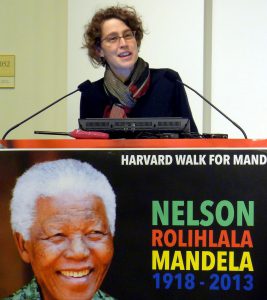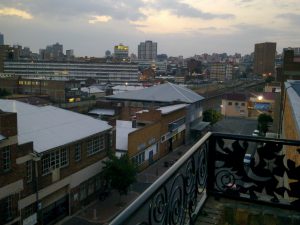


I’ve had two careers before coming to the Kennedy School. One more illustrious than the other. Just after my undergraduate I became a documentary filmmaker and did a lot of adventurous things in my early 20s which were great for dinnertime conversation. One involved making an amateur documentary on the meaning of prison tattoos for which I spent more time than I would have imagined with two inmates in maximum security at Pollsmoor Prison and learned that prisoners use the melted washers from toilets to make their tattoo ink. A couple of years and a few other documentaries later, I found myself sitting in a foot of cold mud in Walvis Bay, Namibia in the middle of winter. I was freezing and tired of dangling a sound boom in the direction of a graceless and cacophonous flock of flamingoes. I began to wonder what I was doing with my life and whether the glass ceiling was already hovering dangerously close to the top of my head. So I went back to Law School and fell in love with how the South African Constitution was breaking new ground in creating law that actively enabled equality. I clerked for one of the best Constitutional Court judges during the beginning of South Africa’s transition to democracy before, after a number of years, becoming a partner at Webber Wentzel (in association with Linklaters). I always worry my dinnertime conversation has deteriorated. For the past ten years I have been working on the government-business interface (which really means I help government get big projects done and help business rectify mistakes that governments make along the way). I also have a pro bono practice which specializes in sexual orientation rights work and have been running cases intended to protect gays and lesbians from violence. One of my cases involves a hate speech claim against the South African Ambassador to Uganda where my client is demonstrating the psychological harms of homophobic hate speech – so watch this space!
When you got accepted to HKS, how did you react and whom did you tell first?
I was shocked. I hadn’t really thought I would get in. I then realized there were so many people who were going to be upset that I was leaving that I didn’t tell anyone (except my partner of course) until I had secured funding and we had decided it was possible to pack up our lives and migrate for a year.
What was your favorite moment from Sochi, Russia, last month?
So, we don’t have a TV. Well, actually that’s not quite true. We have a TV which is about 20 years old and took two people to carry into the apartment. So it’s proved to be a challenge to getting cable working on this antique device. I love sport – but a television has never been particularly important to me and in South Africa we tend to watch sport in bars!
Also, I have never watched a winter Olympics in my life. Winter in South Africa does not exactly involve snow or skis or ice-skating rinks. So I had absolutely no clue what to watch.
But to answer your question my best part of the Sochi Olympics was the image of Vladimir Putin flamboyantly ice-skating on the front page of the New Yorker and then the Canadian Institute of Diversity’s YouTube video of the two-man “gay” luge race – http://www.youtube.com/watch?v=effb2JYiKXM – set to “Don’t you want me, baby” and with the caption “The games have always been a little gay. Let’s fight to keep them that way. Show your support for the equality of all athletes”.
When you’re in my line of work you know how important it is to have a good sense of humor!
What’s the best thing about New England?
The trips I have done to Cape Cod have been amazing. Both in summer and winter. I love wild coasts and have walked along many in South Africa – but I have NEVER walked across an ice-encrusted beach. I have to admit though that I have a bit of a love-hate relationship with New England’s extreme weather.
What do you miss most about Africa?
The things I miss most about South Africa are the dusty roads, the purple Jacaranda trees, the summer thunderstorms, Woolies chicken – and my salary!
We see that you have published in the South African Journal on Human Rights and run cases in the South African Constitutional Court, can you tell us more about your law practice and why you do it?
The two articles I published were on same-sex marriage before it was legal in South Africa, and on differential pricing as a mechanism to get cheap drugs into the developing world. Funnily enough the two cases that I have worked on before the Constitutional Court involved these two issues. One case involved the legalization of same-sex marriage and was an incredible victory for the group of civil society organizations that brought the case (I was a board member of the lead applicant). The other case involved a challenge by pharmacists in South Africa who were being put out of business by a dispensing fee which was inappropriately low. This was also a real victory for community pharmacists in South Africa.
Cricket, rugby, or football?
Rugby!
Because the men are so incredibly huge and I LOVE watching them bash into each other. It must be a South African thing.
Although, I also have to admit that I went to a whole bunch of World Cup Soccer matches and cried for about 10 minutes when Tshabalala scored the opening goal in the match against Mexico.
What one item is essential to your everyday life and why?
In Cambridge my earmuffs; in Joburg my dynamic associates and hyper-efficient secretary.
What are you looking forward to most after you graduate in May?
Summer. I’ve heard it arrives then?
